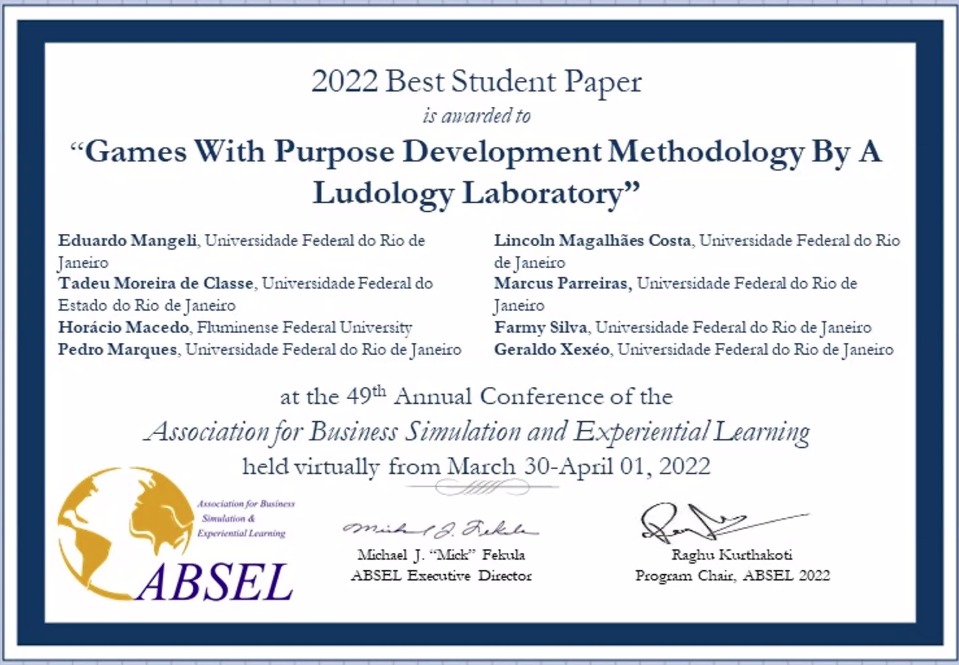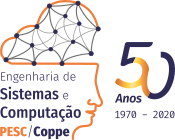LUDES ganha o Best Student Paper na ABSEL-2022
O LUDES ganhou o prêmio “Best Student Paper” da conferência ABSEL-2022 com o artigo “Games with a Purpose Develpment Methodology By a Ludology Laboratory”, escrito por Eduardo Mangeli (M.Sc. e Doutorando/PESC), Tadeu Moreira de Classe (D.Sc. e Professor/UniRio), Horácio Macedo (BCC-UFRJ/Mestrando UFF), Pedro Marques (Graduando UFRJ), Lincoln Magalhães da Costa (ES-UFPR/Doutorando PESC), Marcus Parreiras (Mestre-CEFET/Doutorando PESC) e Farmy Silva (Mestre/Doutorando PESC) e Geraldo Xexéo (Professor do PESC). Veja clicando aqui.
“A Association for Business Simulation and Experiencial Learning (ABSEL) é uma organização para acadêmicos e profissionais que desenvolvem e promovem métodos de ensino inovadores e eficazes nas disciplinas de negócios, gestão e áreas afins.” (do site da ABSEL)
O artigo descreve o resultado do trabalho de vários anos no LUDES, sendo uma construção colaborativa que organizou e registrou o modo de trabalho para o desenvolvimento de jogos com propósito, aqueles que são criados com outro propósito além do entretenimento. Com esse processo criamos vários jogos, como o recente Screener, de tabuleiro, e o Mapa do Tesouro, digital.
Também foi indicado ao mesmo prêmio o artigo “On the Design of Educational Course of Action Wargaming”, do doutorando Leandro Ouriques (Marinha do Brasil), do pós-doc Carlos Eduardo Barbosa (Marinha do Brasil) e do professor Geraldo Xexéo, todos do PESC. Veja clicando aqui.
Parabéns a todos os autores!

Abaixo os resumos dos artigos.
Games with a Purpose Develpment Methodology By a Ludology Laboratory
Abstract
This article presents the formalization of the methodology used by members of a Ludology Laboratory to develop games with purpose. The methodology consists of a five-step process: Conception, Project, Development, Evaluation, and Packaging, and also by the tools and practices used during the execution of its tasks. It was defined by considering experiences of lab members while creating ludic artifacts, other works that also propose processes for this very same end, the study of documentation created during game development within the laboratory, and the logs of these processes. Three examples of the usage of this methodology are shown. This work hopes to contribute to developing new methodologies for designing serious games, which have greater dynamism and collaboration between those involved, whether they are researchers, programmers, artists, or game designers.
On the Design of Educational Course of Action Wargaming
Abstract
The Joint Planning Process is a document that describes the guidelines to employ the Brazilian Armed Forces. The military can also apply these guidelines for educational purposes, to train their staff in times of peace. The Brazilian Ministry of Defense intends to simulate the employment of military forces to speed up the decision-making cycle and increase the chances of operational success. Consequently, actions would be better planned and risks would be better assessed. The Course of Action (COA) Wargaming simulates each friendly COA against the possible enemy COAs. However, the doctrinal process lacks information to describe how to conduct a COA Wargame. Therefore, doctrinal knowledge is limited to systematizing this analysis. COA Wargaming has been subjective and has relied on tacit knowledge. This work aims to propose a method to conduct the COA Wargaming, and a conceptual model to structure the COA Wargaming, enabling the further use of computer systems to support its conduction. Wargames’ concepts inspire this game design. Wargames are defined as models or simulations of conflicts in a synthetic environment, involving opposing forces, in which players make decisions based on rules, procedures, and information. Improving COA Wargaming as an educational wargame tool would simulate military planning, support players to build effective strategies, support instructors to analyze players’ decisions and umpire engagements, and build a technological framework to collect decision data for future applications in knowledge management and artificial intelligence.




